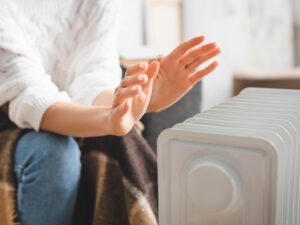6 Reasons Why Your Heater Is Not Blowing Hot Air
 Winters in New Jersey often bring plenty of cold weather, snow, and ice. Staying comfortable during frigid temperatures usually requires a functional furnace, so the last thing you would want is for your heater to break down when you need it most.
Winters in New Jersey often bring plenty of cold weather, snow, and ice. Staying comfortable during frigid temperatures usually requires a functional furnace, so the last thing you would want is for your heater to break down when you need it most.
So, why is your heater not blowing hot air? The top-rated HVAC professionals at Davis Home Services understand that there are several reasons why a furnace stops producing warm air. You can stay warm all season long with heating services in Cherry Hill by Davis Home Services, but if your furnace isn’t blowing hot air, you can find out why in this article.
Why Is Your Heater Not Blowing Hot Air?
1. The Furnace Is Off
The answer to why your heater is not blowing hot air might be your thermostat. With the temperatures changing, it is not unusual to unintentionally set the thermostat incorrectly when shifting from using the air conditioner to using a heater.
When your heater stops blowing warm air, you should first check the thermostat and furnace. Make sure the switch on the heater is in the “on” position. If you have a gas furnace, you might need to use an extender lighter to ignite the pilot light before turning the system on. Then, ensure that you set the thermostat to “heat” and “auto,” not the fan setting.
2. The Air Filter Is Dirty
It is best to change your HVAC’s air filter at least once every three months, but it is easy to overlook this maintenance step. However, furnaces, heat pumps, and air conditioners require plenty of airflow to maintain indoor temperatures. It doesn’t take long for the screens to clog with hair, dust, pollen, pet dander, and other airborne pollutants.
Unless you change the filter, the debris from it will dirty the system and cause a reduction in performance. Components within the heat pump or furnace can overheat and cause the system to break down. As a result, the warm air will stop flowing into the house.
3. The Heater Has an Electrical Problem
Sometimes, a furnace can trip your home’s electrical circuit and stop working. A gas furnace with problems may also shut down as a safety precaution.
You can check your electrical box to see if the system tripped a fuse when that happens. If you are uncomfortable handling this task, you should call an HVAC professional. You likely won’t need an electrician, but a heating and cooling technician can safely troubleshoot the system.
4. The Heat Pump Is Leaking Refrigerant
Your heat pump will act as an air conditioner in the summer and a heater during the winter. It relies on refrigerant for its heat transfer to cool your home and heat production to warm it. A refrigerant leak in the system will prevent the heat pump from sufficiently heating your home.
If your home remains cool because its heat pump does not produce hot air, your refrigerant levels could be too low. A heating technician will need to add more refrigerant after finding and fixing the leak. Unless you address this issue, the refrigerant leak could increase humidity in the house, making it feel colder than average.
5. The Ductwork Has a Leak
Hot air from your furnace travels to every room in your home through ducts and vents. Rooms will feel colder than you may like if there is a leak in the ductwork. Even if the heater produces sufficient heat, the warm air will not circulate through your house if air seeps out of the ducts due to cracks or holes.
Inadequate ductwork insulation could cause leaks. Rodents inside your attic can also get in your ducts and weaken the system.
Drafts from a lack of insulation can also rob the air inside your home of warmth. The combination of a compromised ventilation system and poor insulation will prevent heated air from having a proper distribution throughout your home.
6. The Vents Are Blocked
Another reason your heater is not blowing warm air could be blocked registers or vents. Some people unintentionally block vents with furniture or intentionally block them to drive additional warm air to specific areas in the house. Unfortunately, obstructing or closing the registers prevents the furnace from receiving enough airflow to work correctly.
Unless the heater has enough airflow, the system will overwork to compensate for the loss. An overworked HVAC system will have a premature breakdown, which will prevent the unit from distributing warm air.
Always check your registers to ensure that each one is open to expel air. If you close one vent, that should be the only room that feels cold. If multiple rooms lack warmth with one register closed, you likely have a ventilation issue on your hands.
How to Keep Your Electric or Gas Furnace Blowing Warm Air
Ignoring your heating and cooling system is one of the worst things you can do as a homeowner. These systems require regular maintenance to function correctly. It is a good idea to schedule a professional HVAC tune-up twice a year, once in the fall and again in the spring.
When heating experts tune up your furnace, they will check all its components to ensure that everything is working correctly. The technician will examine the electrical and gas components, change air filters, and make necessary repairs so that the furnace blows warm air through the house.
Call an HVAC Contractor You Can Trust
If your furnace is not blowing hot air, you might want to troubleshoot the issue to keep temperatures comfortable indoors. Some troubleshooting options are simple. For instance, you could check the thermostat to ensure correct settings or change a dirty filter for maximum airflow.
However, it is usually a good idea to reach out to a professional HVAC contractor to handle extensive furnace repairs because working with gas and electrical appliances can be dangerous. If you want to know why your heater is not blowing hot air or learn more about heating repairs, reach out to the team at Davis Home Services by calling 844-226-9872.
HVAC Troubleshooting Tips 6 Steps to Resolve Heater Issues
- Insufficient Maintenance
- Regularly replace air filters every 1-3 months.
- Inspect ductwork for leaks and blockages.
- Calibrate and check the thermostat settings for accuracy.
- Thermostat Issues
- Verify thermostat settings for the desired temperature.
- Replace thermostat batteries regularly.
- Ensure no obstructions around the thermostat sensors.
- Pilot Light Problems
- Check for pilot light ignition regularly.
- Confirm a steady gas supply to the pilot light.
- Turn off the gas supply before attempting to relight the pilot light.
- Gas Supply Issues
- Ensure the gas valve is open.
- Check for gas leaks by smell and sound.
- Follow local gas safety guidelines, especially in Camden County.
- Ductwork Problems
- Visual inspection of ductwork for damage.
- Clear vents and registers of obstructions.
- Seal duct leaks using duct tape for improved efficiency.
- Mechanical Issue
- Listen for unusual noises from the heating system.
- Visually inspect mechanical components for damage.
- Call a professional if issues persist despite DIY efforts.
Remember:
- Safety first! Turn off gas and electricity before attempting any troubleshooting.
- When in doubt, consult a professional HVAC technician.
Benefits of Regular Maintenance
Regular maintenance of your heating system is not just a precautionary measure; it’s a commitment to the longevity and efficiency of your home comfort. Here are the key benefits:
- Improved Energy Efficiency
- Prolonged System Lifespan
- Consistent Heating Performance
- Enhanced Indoor Air Quality
- Cost Savings on Repairs
- Increased Safety
- Environmental Responsibility
Gloucester County: For residents in Gloucester County, where winters can be challenging, regular maintenance is particularly crucial to ensure your heating system can withstand the season’s demands.
Costs of Repair vs. New System
As your heating system begins to exhibit signs of wear and tear, you find yourself at a crossroads—deciding whether to opt for repairs on the current system or invest in a new one. Here’s a detailed breakdown of the costs to assist you in making an informed decision:
- Repair Costs
- Repairing specific issues may seem cost-effective initially. However, these costs can add up, especially if your system experiences frequent breakdowns or requires extensive repairs.
- Repairs might provide a short-term fix, but if your heating system is aging, you could find yourself addressing new issues shortly after each repair.
- New System Costs
- Investing in a new heating system involves a significant upfront cost. However, modern systems are more energy-efficient, potentially leading to long-term savings on energy bills.
- New systems often come with warranties that cover parts and labor, providing peace of mind and reducing the financial burden of unexpected issues.
- Energy Efficiency
- Aging heating systems may operate less efficiently, leading to higher energy bills. Newer systems are designed with energy efficiency in mind, potentially offsetting the initial investment over time.
- Upgrading to a more energy-efficient system contributes to reduced energy consumption, promoting environmental sustainability.
- Frequency of Repairs
- If your heating system requires frequent repairs, the cumulative costs may eventually surpass the investment in a new system.
- A new system provides a fresh start with reliable components, reducing the likelihood of ongoing repair expenses.
For residents in Burlington, Camden & Gloucester County, where winter temperatures can be demanding, investing in a dependable heating system is critical for maintaining comfort throughout the season.
Need guidance on whether to repair or upgrade your heating system? Our experts are here to provide personalized advice based on your specific needs. Contact us for a consultation and make the right decision for your home comfort. Stay warm, stay cozy!

